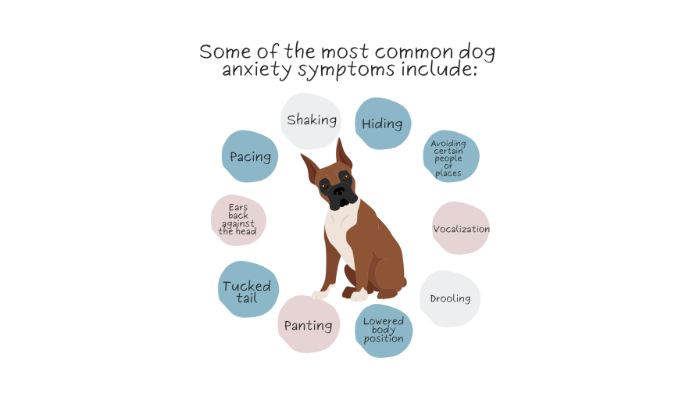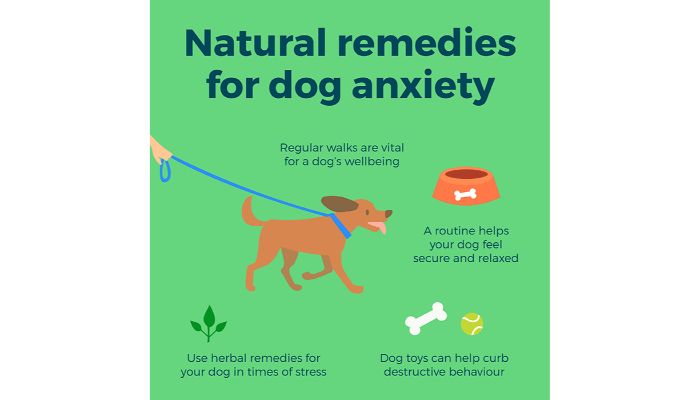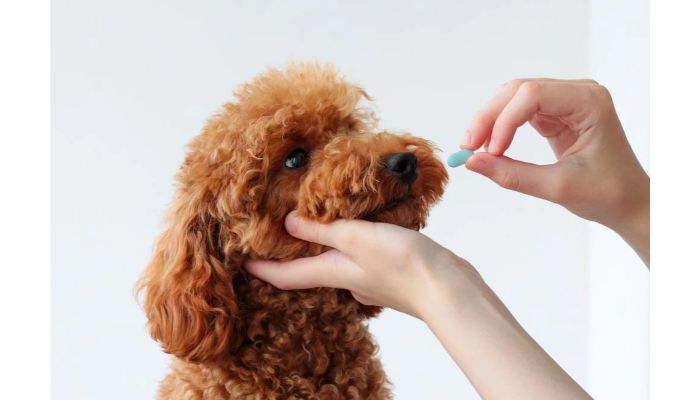Are you at your wit’s end trying to figure out what to give your pup for anxiety? Don’t worry, you’re not alone. Dogs can suffer from anxiety, too, and it’s important to find the best remedy for them.
In this article, we’ll explore the causes of anxiety in dogs, natural remedies, medication options, veterinary care, and prevention strategies.
So, if you’re looking for a solution for your furry friend’s fear and anxiety, you’ll want to read on.
Causes of Anxiety in Dogs Interactions:

Anxiety in dogs can be caused by a variety of factors, such as environmental triggers and lack of stress management.
For instance, loud noises, like fireworks or thunderstorms, can cause fear-related anxiety in dogs.
Additionally, if your pet isn’t well-socialized or is in an unfamiliar environment, this could lead to anxious behavior.
Furthermore, changes in routine or the introduction of new people, animals, or objects can trigger anxiety.
To prevent it, it’s important to gradually introduce changes and create a secure, comfortable environment for your pet.
Stress management techniques, such as regular exercise and mental stimulation, can also help reduce anxiety.
Natural Remedies for Dogs:

If your pup is anxious, there are some natural remedies you can try:
- Finding calm environments: Taking your pup for a walk in a peaceful park or out on an early morning stroll can help reduce his stress and anxiety.
- Positive reinforcement: Reward your pup for positive behaviors with treats and verbal praise.
- Natural supplements: There are natural calming supplements available for dogs, such as chamomile, valerian root, lavender, and L-theanine.
When dealing with a dog experiencing anxiety, it’s important to be patient and understanding. Natural remedies can help, but it takes time and consistency to make a difference.
Choosing the Right Medication for Your Dog:

In addition to natural remedies, there are also several medications that can help treat anxiety in dogs.
| Medication | Potential Side Effects | |
|---|---|---|
| Alprazolam | Loss of appetite, confusion | |
| Buspirone | Lethargy, agitation | |
| Clomipramine | Vomiting, increased heart rate | |
| Fluoxetine | Tremors, excessive urination |
Alternative treatments like acupuncture or massage can be beneficial, but medications are often the most effective way to reduce a dog’s anxiety. It is important to speak to a vet to determine which medication is best for your dog and to monitor any potential side effects.
Role of Veterinary Care for Dogs:
It’s important to have your dog examined by a vet to determine the best course of treatment for their anxiety. Veterinary care can help reduce your pet’s anxiety symptoms and can include:
- Behavioral Training: Training your dog to respond to simple commands. Utilizing positive reinforcement to reward desired behavior. Working with a professional to identify and modify any behaviors that cause anxiety.
- Exercise Routine: Establishing an appropriate exercise routine for your pet. Ensuring they get plenty of playtime, walks, and other forms of stimulation. Incorporating a variety of activities to help keep them occupied.
- Medication: Discussing the option of anti-anxiety medication with your vet. Exploring the potential side-effects of the medication. Monitoring your pet’s response to the medication and adjusting the dosage as needed.
Pet Prevention Strategies:
By taking proactive steps, you can help prevent your dog from developing anxiety. Positive reinforcement, such as using treats to reward good behavior, can be effective in reducing anxiety. Environmental enrichment, like providing toys and puzzles or introducing new activities, can also help reduce anxious behavior.
| Positive Reinforcement | Environmental Enrichment |
|---|---|
| Treats for good behavior | Toys & puzzles |
| Praise & rewards | New activities |
| Consistent rules | Stimulating environment |
Frequently Asked Questions:
Signs of anxiety in a dog can include pacing, panting, excessive barking, and hiding. Pay attention to changes in your dog’s exercise routine or the need for comfort toys. These can be indicators of anxiety.
Research shows that over 60% of dogs suffer from anxiety. To help your dog feel less anxious, try managing stress and engaging in calming exercises. Create a safe, comfortable environment for your pup and set aside quality time with them every day. Additionally, look into natural supplements and calming products to support them.
If your dog is exhibiting signs of anxiety, such as increased barking, pacing, panting, or chewing, you may want to consider natural remedies or environment changes before turning to medication. Look for changes you can make to help your pet feel more secure.
Yes! Crate training and socialization are two effective ways to reduce your dog’s anxiety. Proper crate training can help your dog feel secure and relaxed in the home while socializing them with other dogs and people can help build trust and reduce fear.
You should take your dog to the vet regularly to monitor their anxiety and discuss any behavioral adjustments or environmental changes that could help. Contracting a professional is the best way to ensure your pet is getting the care they need.
Conclusion:
Anxiety in dogs can be a difficult thing to deal with, but with the right knowledge and tools, you can help your pup stay calm and relaxed.
Natural remedies such as exercise, diet changes, and pheromone therapy are great ways to reduce anxiety. When medication is necessary, talk to your vet to find the right option for your pup.
Finally, prevention strategies like positive reinforcement and environmental enrichment are key for long-term success. With the right combination of knowledge and care, you can give your dog the peace of mind they deserve.

Hey there, I’m Janet Brooks, a dog-loving student from California. I’m all about helping pups in need, especially those without homes. Me and my awesome friends work together to give shelter and love to stray dogs. Oh, and I also write blogs about dogs to share helpful info.